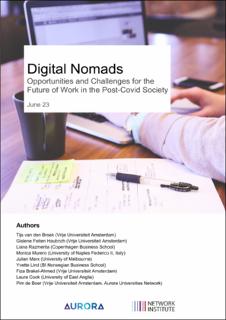| dc.description | In June 2022, a workshop focused on the growing phenomenon of Digital Nomads within the digital workforce was organised. This collaborative effort between Aurora Universities and the Network Institute at VU Amsterdam served as a forum for European Commission policymakers and early career researchers to discuss how society, employers, and employees can adapt to this new way of working.
The workshop highlighted four key objectives: firstly, to identify the necessary actions from policy-makers and scientists; secondly, to foster connections between researchers and European Commission policy-makers; thirdly, to catalyse research collaborations; and finally, to generate a publicly accessible written report encapsulating the discussions and findings.
The comprehensive white paper titled “Digital Nomads: Opportunities and Challenges for the Future of Work in the Post-Covid Society” emerged as the tangible outcome. This document will inform policy and strategy-making efforts, potentially influencing regulations and Research & Innovation (R&I) calls. It has been shared with policy officers in DG Employment and DG RTD for input and consideration and is scheduled for publication in a semi-scientific journal.
The lessons learnt from this whitepaper underscore the value of engaging early career researchers in EU policymaking related to R&I, given the tangible results that can be derived. However, executing such workshops requires a long-term commitment from organisers and participants alike. While the discussion topic needs to resonate with policymakers to ensure early engagement from the European Commission, the autonomy to choose the topic should lie with the organisers, upholding the principle of academic freedom.
To ensure the participation of early career researchers, a limited travel budget is crucial. In this case, the Network Institute commendably provided about 300 euros per person upon request, facilitating their attendance. This act of generosity highlights the importance of funding in enabling such workshops. As such, a heartfelt appreciation goes out to the Network Institute for their invaluable support and sustained enthusiasm, as well as to all the participants who played a pivotal role in the workshop’s success. | en_US |
